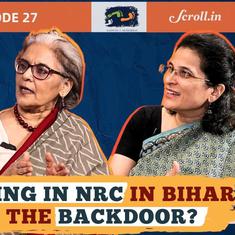Rajya Sabha members given GST Bill amendments ahead of Wednesday's hearing
Finance Minister Arun Jaitley informed the House of the development after Samajwadi Party member Naresh Agarwal said he has yet to receive the copies.

The government has circulated amendments to the Goods and Services Tax Bill among members of Parliament, reported PTI. The changes to the Bill were handed over to the Secretariat of the House as well as to legislators two days ago, Finance Minister Arun Jaitley informed the Rajya Sabha on Tuesday.
The Union minister's reply came after questions raised by Samajwadi Party member Naresh Agarwal who said he has yet to receive copies of the Bill and the amendments. Deputy Chairman PJ Kurien said the Bill was circulated to members of the House in August 2015. "However, if you need one more copy, [Rajya Sabha] Secretariat will circulate it," he said. Jaitley added that the government has distributed the amendment, as well.
The GST Bill has been listed for hearing in hearing in the Rajya Sabha on Wednesday. The Narendra Modi government has been trying to pass it since it came to power in 2014. It envisions scrapping India’s many indirect taxes and creating a single tax regime. It was passed in the Lok Sabha, but not in the Upper House, where the Bharatiya Janata Party does not have a majority. The government put forward the Bill for hearing and passage after renewed talks with the Opposition went positively.
The BJP government has secured the support of all the major opposing parties, with Janata Dal (United) chief Nitish Kumar giving his assent recently. The Trinamool Congress, Janata Dal and Samajwadi Party also assured the Centre of their support. The Bill’s biggest opponent, the Congress, indicated on Thursday that they were finally budging on the issue. Party leaders met on Monday and appeared to arrive at a consensus.
The GST Bill seeks to bring in a single tax rate to replace India’s complicated current rules, which include Central excise duty, service tax, additional customs duties, value added tax, entertainment tax and so on. The Centre believes this will help create a unified market in the country, avoiding double taxation and increase compliance. The GST will have a Central component, and a state component, which both forms of government will administer at their levels.









